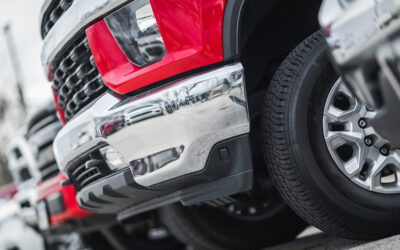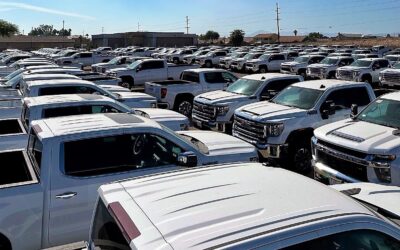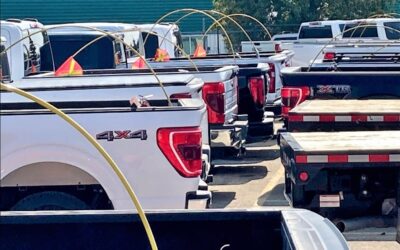What Is Fleet Truck Maintenance?
Of the many responsibilities that fleet managers deal with, fleet truck maintenance is one of the most important and most demanding. Fleet maintenance involves managing your fleet of trucks to ensure that each vehicle is in working condition, which includes processes such as regular maintenance, inspections, and repairs to prevent breakdowns and prolong the lifespan of your fleet. Every vehicle within the fleet requires upkeep and monitoring, which takes time, money, and planning.
Creating and fulfilling a truck fleet maintenance strategy is no small feat, especially because fleets often have a variety of truck types, sizes, and uses; but, adequately maintaining fleet vehicles is an essential part of the job. This post aims to give you all the information you need to properly maintain your fleet in the 21st century.
Benefits of Fleet Truck Maintenance
Maintaining your fleet is more of a necessary practice than a bonus one, especially if you want to avoid compliance issues, business downtime, expensive repairs, and ultimately, loss of revenue. There are all kinds of advantages you may not even be aware of, and some of those key benefits of fleet maintenance include the following:
- Preventative maintenance. If you only repair vehicles when they break down, you will own some needlessly expensive vehicles. Regular and preventative maintenance helps identify issues before they become major problems, which helps you avoid costly repairs down the line.
- Vehicles are always in good condition. Maintaining a fleet means ensuring that each vehicle is always in top-notch condition, helping reduce the risk of breakdowns and improving safety on the road. Plus, vehicles that run properly are more efficient, and efficient vehicles require fewer resources, optimize fuel use, and more.
- Prolongs life span. You can extend the life of your fleet and each vehicle individually when you provide the best maintenance, which saves money and time.
- Low cost of repairs. Not only does maintenance prevent unpredictable expenses, but it also gives you greater control over the costs and budget of your fleet management since you have a stronger sense of where your money will be going.
- Higher level of safety. To protect the vehicle, your driver, and other drivers on the road, your vehicles need to be running correctly. Doing so prevents dangerous breakdowns, faulty equipment, and other potential risks and injuries that drivers may face.
- Maximizes resale value. The better shape your vehicle is in from when you initially purchase it, the less it depreciates over time. Regular maintenance and repairs can help maintain the value of your fleet, maximizing resale value.
Fleet Truck Maintenance Strategy
The main purpose of having a truck fleet maintenance strategy is to
- prevent unnecessary repairs and maintenance costs with regular care and upkeep and
- have the tools and systems in place to quickly and effectively repair issues when they do arise.
This ensures that you have little to no downtime and extends the lifespan of your trucks so that you not only offer the best customer service but also maximize your revenue and ROI. Depending on the industry or services you offer, you will likely have different-sized vehicles with different maintenance needs; so, building a strategy that helps you manage the entire fleet and its unique challenges is key to your business objectives. Here are some of the best tools, processes, and principles to implement into your strategy.
- Tracking software. One thing you can do to ensure maintenance is happening enough is by using software that tracks the repairs and mileage to ensure the maintenance is done on time. This is the best innovative way to track maintenance schedules, guarantee that regular maintenance is performed, and generate reports to help you monitor future needs.
- Standard vehicle inspections. Performing standard vehicle inspections is another essential strategy for fleet truck maintenance. Regular inspections can help you identify issues early so that a small problem doesn’t snowball into a huge and costly problem down the road. Inspections should include tires, brakes, fluids, and other components that fortify the function and safety of your vehicles.
- Preventative maintenance. We’ve touched on just how helpful preventative maintenance is, but what exactly does preventive maintenance look like? Preventative maintenance involves performing regular upkeep tasks, such as oil changes, tune-ups, and fluid checks, to prevent breakdowns and prolong the lifespan of your vehicles.
- Track vehicles with telematics. Fleet telematics includes devices, sensors, and other tools that track and store the digital operations of a vehicle. Using telematics to track your vehicles can help you monitor your vehicles’ performance and identify potential issues early. They can provide data on engine performance, fuel consumption, driver behavior, and other factors that lead to greater insights into the state of the vehicle. This data can help you make informed decisions about maintenance and repairs, prevent breakdowns, and understand the ins and outs of your trucks.
- Automate workflows. With fleet technology, you can not only know when your vehicles need maintenance, but you can also streamline your processes to move your trucks quickly through the shop for fleet repair services and fleet maintenance services. Many platforms provide reminders for upcoming work and allow users to view work order statuses in real time. These systems also help you track the costs and control expenses of any repairs so that you can better manage your budget with an itemized breakdown.
3 types of fleet workers
Fleet truck maintenance requires the collaboration of three types of fleet workers: fleet managers, drivers, and fleet mechanics. Each type of worker has specific responsibilities that serve the lifespan and health of your trucks, and when everyone knows and performs their role, your fleet efforts will run seamlessly.
Fleet Managers
Fleet managers are primarily responsible for overseeing the entire fleet. They plan and schedule maintenance and design the maintenance program so that all vehicles are well cared for and accounted for. This includes day-to-day operations and big-picture strategies that account for future upkeep. Fleet managers must work closely with drivers and fleet mechanics to ensure that maintenance is performed thoroughly and on time.
They must also stay up-to-date with regulations and best practices related to fleet truck maintenance so that the fleet and business practices adhere to those standards and compliance laws. Fleet managers are always looking for areas to improve as they monitor the performance of their fleet, work to retain the value of their vehicles, and ensure the safety of their crew.
In a nutshell, fleet managers:
- Oversee the fleet
- Plan maintenance
- Oversee maintenance schedule
- Designing the maintenance program
Drivers
Drivers are the first line of defense in identifying potential issues early, such as tire wear, brake issues, or warning lights on the dashboard. Drivers must also follow safe driving practices, such as avoiding hard braking, accelerating, or taking turns too quickly, which can cause unnecessary wear and tear on the vehicle and put themselves and others at risk. Drivers must also communicate well and frequently with fleet managers and fleet mechanics to ensure that issues are addressed quickly and proficiently.
When you break it down to the basics, drivers are responsible for:
- Driving safely
- Providing care for the vehicle
- Offering a daily diagnosis of the vehicle’s condition
- Informing the manager of warning lights or any issues
Fleet mechanic
Finally, we have the fleet mechanics, who are solely dedicated to the actual maintenance of the entire fleet, especially when it comes to regular/preventative maintenance. Managers consider the fleet as a whole and help monitor the health of the vehicles while the mechanic performs the actual work, such as oil changes, tire rotations, and tune-ups. They diagnose and repair any issues that arise and work to minimize downtime and repair costs. Fleet mechanics must also stay up-to-date with new technology and regulations related to fleet truck maintenance and use their expertise to recommend improvements to the fleet.
Essentially, fleet mechanics are in charge of:
- Regular maintenance of the fleet
- Ensuring cost-effective solutions
- Providing their expertise in vehicle care
- Understanding new technology and regulations
Trust Summit Fleet Trucks
Maintenance is without a doubt one of the most significant responsibilities of having fleet vehicles, particularly in terms of cost and management. Learning how to put a successful and effective maintenance strategy into place is a core element of any fleet business and should be mastered quickly to protect your investments. This includes hiring the best team, delegating the different roles of fleet maintenance to trusted fleet workers, and purchasing the most helpful and innovative resources that your business can afford.
If maintaining a fleet of vehicles is overwhelming to you and you’re looking for another solution, Summit Fleet provides your business with fleet trucks when you need them, even in large orders of 50 or more vehicles. Perfect for any industry, our vehicles come with no long-term commitments and can come with services like GPS tracking, XM radio, and more. Instead of buying and maintaining your own vehicle, renting gives you the vehicles you need, when you need them, with no upfront capital.
Contact Summit Fleet to learn more about our available fleet today!






